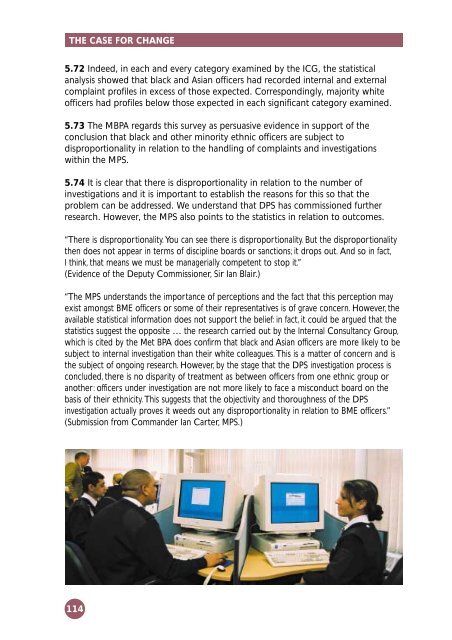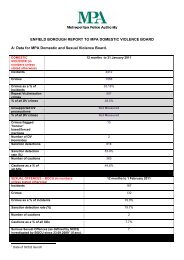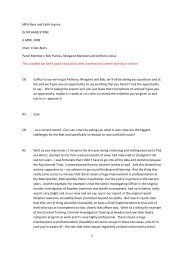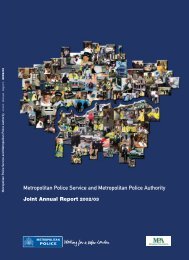Final Report of the Morris Inquiry: The Case for Change
Final Report of the Morris Inquiry: The Case for Change
Final Report of the Morris Inquiry: The Case for Change
You also want an ePaper? Increase the reach of your titles
YUMPU automatically turns print PDFs into web optimized ePapers that Google loves.
THE CASE FOR CHANGE<br />
5.72 Indeed, in each and every category examined by <strong>the</strong> ICG, <strong>the</strong> statistical<br />
analysis showed that black and Asian <strong>of</strong>ficers had recorded internal and external<br />
complaint pr<strong>of</strong>iles in excess <strong>of</strong> those expected. Correspondingly, majority white<br />
<strong>of</strong>ficers had pr<strong>of</strong>iles below those expected in each significant category examined.<br />
5.73 <strong>The</strong> MBPA regards this survey as persuasive evidence in support <strong>of</strong> <strong>the</strong><br />
conclusion that black and o<strong>the</strong>r minority ethnic <strong>of</strong>ficers are subject to<br />
disproportionality in relation to <strong>the</strong> handling <strong>of</strong> complaints and investigations<br />
within <strong>the</strong> MPS.<br />
5.74 It is clear that <strong>the</strong>re is disproportionality in relation to <strong>the</strong> number <strong>of</strong><br />
investigations and it is important to establish <strong>the</strong> reasons <strong>for</strong> this so that <strong>the</strong><br />
problem can be addressed. We understand that DPS has commissioned fur<strong>the</strong>r<br />
research. However, <strong>the</strong> MPS also points to <strong>the</strong> statistics in relation to outcomes.<br />
“<strong>The</strong>re is disproportionality. You can see <strong>the</strong>re is disproportionality. But <strong>the</strong> disproportionality<br />
<strong>the</strong>n does not appear in terms <strong>of</strong> discipline boards or sanctions; it drops out. And so in fact,<br />
I think, that means we must be managerially competent to stop it.”<br />
(Evidence <strong>of</strong> <strong>the</strong> Deputy Commissioner, Sir Ian Blair.)<br />
“<strong>The</strong> MPS understands <strong>the</strong> importance <strong>of</strong> perceptions and <strong>the</strong> fact that this perception may<br />
exist amongst BME <strong>of</strong>ficers or some <strong>of</strong> <strong>the</strong>ir representatives is <strong>of</strong> grave concern. However, <strong>the</strong><br />
available statistical in<strong>for</strong>mation does not support <strong>the</strong> belief: in fact, it could be argued that <strong>the</strong><br />
statistics suggest <strong>the</strong> opposite … <strong>the</strong> research carried out by <strong>the</strong> Internal Consultancy Group,<br />
which is cited by <strong>the</strong> Met BPA does confirm that black and Asian <strong>of</strong>ficers are more likely to be<br />
subject to internal investigation than <strong>the</strong>ir white colleagues. This is a matter <strong>of</strong> concern and is<br />
<strong>the</strong> subject <strong>of</strong> ongoing research. However, by <strong>the</strong> stage that <strong>the</strong> DPS investigation process is<br />
concluded, <strong>the</strong>re is no disparity <strong>of</strong> treatment as between <strong>of</strong>ficers from one ethnic group or<br />
ano<strong>the</strong>r: <strong>of</strong>ficers under investigation are not more likely to face a misconduct board on <strong>the</strong><br />
basis <strong>of</strong> <strong>the</strong>ir ethnicity. This suggests that <strong>the</strong> objectivity and thoroughness <strong>of</strong> <strong>the</strong> DPS<br />
investigation actually proves it weeds out any disproportionality in relation to BME <strong>of</strong>ficers.”<br />
(Submission from Commander Ian Carter, MPS.)<br />
114





![Appendix 1 [PDF]](https://img.yumpu.com/51078997/1/184x260/appendix-1-pdf.jpg?quality=85)

![Transcript of this meeting [PDF]](https://img.yumpu.com/50087310/1/184x260/transcript-of-this-meeting-pdf.jpg?quality=85)
![Street drinking in Hounslow [PDF]](https://img.yumpu.com/49411456/1/184x260/street-drinking-in-hounslow-pdf.jpg?quality=85)








